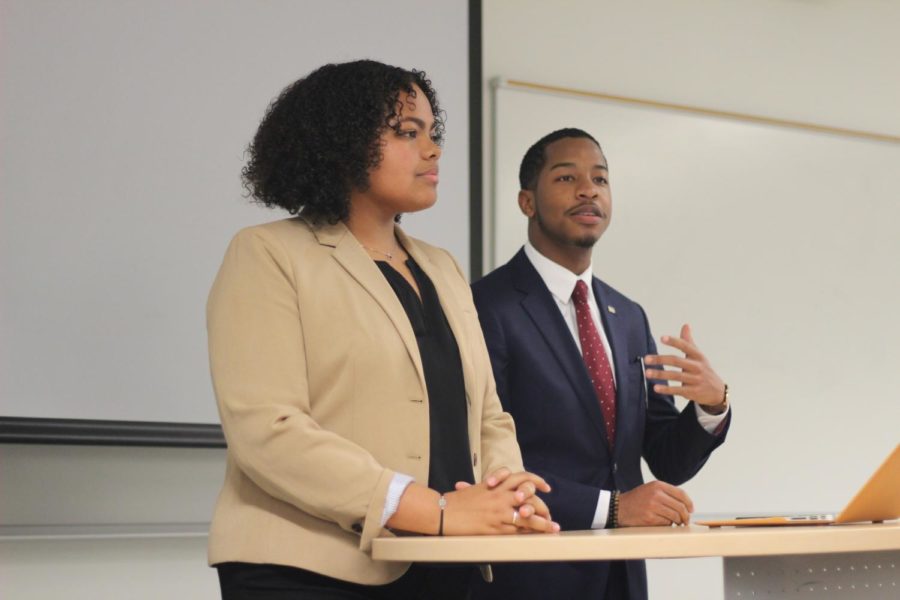SGA elections consist of system changes, few candidates
Jessamyn Reichman and Freedom Richardson discuss their policies at the SGA debate on March 12, 2019. The candidates for president, vice president, and senators all participated in the debate. Photo credit: Cristian Orellana
March 13, 2019
The Student Government Association kicked off election season with a set of voting changes, one presidential ticket and a slate of senate candidates, but not enough to fill the current number of open seats.
Barring any unexpected changes to the elections process before voting ends on Thursday, March 14, Jessamyn Reichmann and Freedom Richardson, the only presidential ticket running, will clinch the position of president and vice-president when the official announcement is made on Friday, March 15.
As opposed to last year’s three presidential tickets, voters will only have the one option for president and vice-president this year. The ballot does not provide a no option, a no confidence option or any place to write-in another name.
Although neither the SGA’s election code or SGA constitution make any mention of unopposed candidates, Rana Thabata, chief justice and elections commissioner, said Reichmann and Richardson need only a simple majority or “one-vote” to win.
Election Changes
The elections process was quick this year. Candidates were only able to announce last Thursday, March 7, less than a week before voting was slated to begin. This allowed six days of campaigning – only two of which were days where class was being held on campus. Thabata said the shortened timeline was chosen to allow an adequate transition period between the outgoing and incoming administrations.
“With the new administration being sworn in on April 10, that only gives us about three weeks to transition them, and transitioning last year was only a day transition,” Thabata said. “I have already talked to the current cabinet about taking the new person on as a mentee and showing them the ropes.”
Once the presidential team is chosen, they have a week to determine who they will interview for cabinet positions, and they’ll then have to choose within the following week to allow for that transition period.
Another change throughout the process was the amount of voting time allocated to students. According to SGA’s election code, at least 17 hours must be provided for students to vote. Originally, Thabata only had one day of voting planned – March 14. But, after considering voter turnout and speaking with former SGA President Ben Weil, Thabata decided to extend the voting period to two days – 16 hours of polling sites and 48 total hours of voting in order to hopefully bolster number of voters.
“We have such a small campus. In the past, I think we’ve gotten about 700 total votes, around there, which is not very representative of our campus,” Thabata said. “We should try to get at least 1,000 votes.”
In another unprecedented change, SGA will release voter percentages for all candidates and the total number of votes. While they will not release the vote count each candidate received, the numbers will be available for anyone wanting to do the math.
Presidential Platform
Reichmann, sociology junior and Richardson, political science junior, are running on a three-point plan that includes organization and restructuring, beautification and utilization, and a focus on Jesuit values. While Reichmann has no previous SGA experience, she expressed confidence in her ability to serve as president due to her three years of on-campus involvement in a variety of organizations like Black Student Union, Ignacio Volunteers and admissions, and the extensive network of authentic relationships she has built.
Richardson, on the other hand, is currently serving as one of two senators at large in this year’s SGA administration. As vice-president, Richardson would be responsible for leading the Senate, a role that he said will allow him to make some necessary changes including being more formal in the way they structure their meetings,
“We need to make sure SGA meetings are being advertised,” Richardson said. “We want to be intentional about who comes into our senate meetings and make sure our decisions are being made as public as possible.”
Reichmann and Richardson both answered questions posed by Thabata at the debate. The team emphasized their commitment to implementing their initiatives quickly once elected and being transparent and accountable to students.
Both stressed that while they believe this year’s SGA administration had done a good job, they believed they could make important changes to better the system. Reichmann suggested that students on campus this year may not be aware of the current administration’s work due to a lack of communication and vowed to be more communicative and transparent.
Richardson echoed her thoughts.
“I think this administration has to be more intentional in how they’re being visible, how they’re being available to the public and making sure that the things we’re working to fix are tangible,” Richardson said.
He also said he hopes to improve communication between the executive branch of SGA and the senators serving in the legislative branch – communication that he said is absent right now.
“There was no sense of cohesion within our student government Senate. No sense of teamwork or collaboration,” Richardson said. “We definitely have to enhance that sense of cooperation and environment of collaboration and being intentional in how we communicate those decisions.”
The team admitted that they were surprised when they found out they were running unopposed, but that news allowed them to shift their campaign style to being more intentional in all that they do.
“We don’t want to be seen as just walking into this position, so I think we need to make sure there is accountability,” Reichmann said.
Richardson also saw the circumstance as an opportunity.
“Something we can certainly do, regardless of having been faced with no formal challenger, is making sure that we confront these formal challenges as bluntly and honestly as possible,” Richardson said. “Instead of the theatrics of a typical student government campaign, we’re able to campaign more on the issues and less on the theater.
Senators’ Initiatives
After the withdrawal of Kevin Aguilar from the race for senator of the College of Music and Media, SGA has a ticket consisting of all female senate candidates. Gabriela Martinez and Chloe Dupleix are running for the two vacant senator at large positions. Emily Mccrory, Glory Tomi John, Brenda Valladeres, Samantha Sanchez, Brionna Adams and Jourdan Greene are running for six of the seven vacant senator positions within the College of Arts and Sciences. Taylor Fontenot and Sky Stubbs are vying for two of the seven vacant spots in the new College of Music and Media, while Carrie Elizabeth Smith is the only candidate running for the three open positions in the College of Business.
Richardson acknowledged what he called “the elephant in the room,” and said his first priority once elected will be to fill the vacant positions that will remain in the senate after the election.
Thabata said that depending on fall enrollment numbers, a third senator at large position may be necessary, but that decision will be made next semester.
Senators spoke on platforms ranging from mental health awareness to providing business etiquette workshops, with a majority of senators mentioning food insecurity as a major issue they hope to tackle.
Voting
Voting began on Wednesday, March 13 and continued through Thursday, March 14. Although four polling spots were originally scheduled, the site located in the Residential Quad was canceled on Tuesday night due to inclement weather and a lack of people to run the site.
The announcement of winning candidates will be made during Crawfish in the Quad on Friday, March 15 at 3:30.









Butch • Mar 15, 2019 at 11:34 am
ASGA, the American Student Government Association, offers many dozens of specific suggestions and recommendations on how to improve student government elections. Loyola has been a member of ASGA in the past, but has not availed itself of the wealth of resources ASGA offers our 1,500 member institutions nationwide.